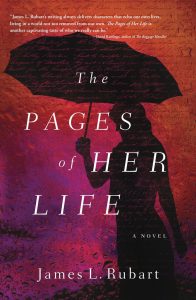by James L. Rubart, @jameslrubart
In September of ’07, I stood in line at a writer’s conference, waiting to get a book signed by an author who had become a friend. We’d talked in depth (30 minutes plus) at three different conferences and had exchanged a number of e-mails.
I was still in the early stages of my career—three years away from my first novel being published—and it was a thrill to get an autograph from a published author.
As I came to the front of the line I handed her my copy of her novel, we chatted for a few minutes, she signed my book, and I moved on.
When I opened the book to see what she’d written to me I was surprised. And disappointed.
It said, “Jim, God bless,” and then her signature.
It felt like a cliché.
I thought we’d developed enough of a relationship that she would write something more personal in nature―such as, “Great getting to know you” or “I’ve enjoyed our talks,” or, “You’re going to make it!”
On the Other Side
Now that I’m on the other side, I realize that when you’re signing multiple books at one time it’s tempting to write something generic and short to prevent your hand from cramping up, but I think taking the time to write a quick personal note is worth the extra effort.
Word of mouth will always be the most powerful form of promotion, and you want readers to go away feeling special, feeling unique, feeling worth it. Result? They’ll talk about you and your books to their friends.
Name Only?
Some authors choose to sign their name and that’s it. Does that work? Sure. No chance of disappointing readers with what they write, since they don’t write anything. But I still think readers are disappointed. Many times the readers want an autograph because the author inspired them, or challenged them, drew them closer to Jesus—and because of that, they feel they know the author personally. I believe a signature only takes a little air out of their balloons.
Plan Ahead
Some of us can come up with pithy comments off the top of our heads. Others, not so much. So plan ahead with three or four comments for readers you don’t know.
For those you do know, take a few seconds and make it personal. They’ll love you for it.
Until next month, God bless all of you. (I hope you’re laughing.)
 How Do You Stand Up for Yourself When It Means Losing Everything?
How Do You Stand Up for Yourself When It Means Losing Everything?
Allison Moore is making it. Barely. The Seattle architecture firm she started with her best friend is struggling, but at least they’re free from the games played by the corporate world. She’s gotten over her divorce. And while her dad’s recent passing is tough, their relationship had never been easy.
Then the bomb drops. Her dad was living a secret life and left her mom in massive debt.
As Allison scrambles to help her mom find a way out, she’s given a journal, anonymously, during a visit to her favorite coffee shop. The pressure to rescue her mom mounts, and Allison pours her fears and heartache into the journal.
But then the unexplainable happens. The words in the journal, her words, begin to disappear. And new ones fill the empty spaces—words that force her to look at everything she knows about herself in a new light.
Ignoring those words could cost her everything . . . but so could embracing them.
 James L. Rubart is 28 years old, but lives trapped inside an older man’s body. He thinks he’s still young enough to water ski like a madman and dirt bike with his two grown sons. He’s the best-selling, Christy BOOK of the YEAR, CAROL, INSPY, and RT Book Reviews award winning author of ten novels and loves to send readers on journeys they’ll remember months after they finish one of his stories. He’s also a branding expert, audiobook narrator, co-host of the Novel Marketing podcast, and co-founder with his son, Taylor, of the Rubart Writing Academy. He lives with his amazing wife on a small lake in Washington state.
James L. Rubart is 28 years old, but lives trapped inside an older man’s body. He thinks he’s still young enough to water ski like a madman and dirt bike with his two grown sons. He’s the best-selling, Christy BOOK of the YEAR, CAROL, INSPY, and RT Book Reviews award winning author of ten novels and loves to send readers on journeys they’ll remember months after they finish one of his stories. He’s also a branding expert, audiobook narrator, co-host of the Novel Marketing podcast, and co-founder with his son, Taylor, of the Rubart Writing Academy. He lives with his amazing wife on a small lake in Washington state.


Comments 1
I think it gets hard to remember that even though YOU, the author, see a line of people, the person in line sees YOU, just one author. So for the person in line, it IS relational. And while, sure, you can’t make up a slew of new things on the fly, a 15 second conversation can turn a generic into a memorable moment for a fan.
“It was great to see you!”
“Glad you came out!”
“Go [sports team fan is wearing]!”
“Live long and prosper!”
So on and so on .. doesn’t mean we, as authors, need to write a paragraph, but just something less … generic. “God bless, Jim” is ok. But what about “It was great to see you! God bless you, Jim!” Now, you are personalized.
Of course, no one asks for my autograph anymore unless I’m signing a check for a bill collector. 😀